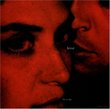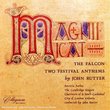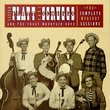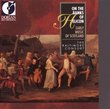| All Artists: George Frideric Handel, Anthony Lewis, Margaret Ritchie, William Herbert, Nancy Evans, Helen Watts Alfred Deller Title: Handel - Sosarme / Deller ∑ Ritchie ∑ Herbert ∑ Evans ∑ Watts ∑ Saint Celicia Orch. ∑ A. Lewis Members Wishing: 0 Total Copies: 0 Label: Opera D'oro Release Date: 10/30/2001 Genre: Classical Styles: Opera & Classical Vocal, Historical Periods, Baroque (c.1600-1750) Number of Discs: 2 SwapaCD Credits: 2 UPC: 723724189928 |
Search - George Frideric Handel, Anthony Lewis, Margaret Ritchie, William Herbert, Nancy Evans, Helen Watts Alfred Deller :: Handel - Sosarme / Deller ∑ Ritchie ∑ Herbert ∑ Evans ∑ Watts ∑ Saint Celicia Orch. ∑ A. Lewis
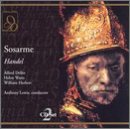 | George Frideric Handel, Anthony Lewis, Margaret Ritchie, William Herbert, Nancy Evans, Helen Watts Alfred Deller Handel - Sosarme / Deller ∑ Ritchie ∑ Herbert ∑ Evans ∑ Watts ∑ Saint Celicia Orch. ∑ A. Lewis Genre: Classical
|
Larger Image |
CD DetailsSimilarly Requested CDs
|
CD ReviewsFine Transfer of a beautiful performance Paul E. Hartman | Los Angeles | 01/27/2007 (5 out of 5 stars) "Despite the almost hysterical exaggerated criticism of the last reviewer (and I guess there's nothing worse than a singer-reviewer bitching about the perceived deficits of another singer!)I would not dismiss this recording UNLESS you insist on having your Handel 1) taken at a constantly brisk tempo (which to me is usually "Too Fast, sorry"); 2)filled with countertenors, such as some mentioned in the last review (which to me is "The fewer countertenors, the better"); 3) played only on so-called "original" instruments by the new batch of musicologist-conductors (which to me is sometimes "great" but sometimes also "Good Lord, what hideous unmusical scraping noises, what an uninspired unmusical performance"). Let's make it simple: If you like the recordings of Johannes Somary or those on Vox by Rudolph Palmer or by Richard Auldon Clark, then you should enjoy this recording. Margaret Ritchie, the Elmira, is a well-known name to any with even a passing knowledge of the British musical scene from the 1940's and 1950's; HARDLY a singer only worthy of "G&S" as insultingly mentioned in the last review; she made a number of famous recordings justly praised at the time. True, her voice is not that of a younger singer, but then the same could be said of many others, e.g. Maggie Teyte. But here she manages the Handelian fioritura with ease, and ?the scooping so offensive to the previous reviewer, well I'm at a loss to see where this occurs often or even obtrusively; that criticism seems like a bunch of exaggerated nonsense to me! If you don't like Alfred Deller, then that's one thing; but he sings expressively and competently here. Likewise, the lesser roles here are taken by capable singers, Helen Watts included, a veteran of many a fine Handel recording. True, the general tempos are on the slow side, but I for one prefer a more genteel expressive way with Handel; and this is not a work noted for its wild dramatic scenes anyway. Anthony Lewis, a fine early conductor of Baroque music, does however respond with impetus, when needed, in the choruses, and gives the singers ample room enabling them to give full meaning to the text. Opera d'Oro has done a better job of transferring this onto CD than the previous issue on Theorema; the latter had too much surface hiss. And I have not heard the Andromeda label version of this performance recently issued on CD. " A glorious opera, but oh! The pains of this dated recording! Ingrid Heyn | Melbourne, Australia | 10/05/2004 (1 out of 5 stars) "Sosarme is a truly beautiful work, full of delicious arias and a quite magnificent duet "Per le porte" for the soprano and counter-tenor. It is hard to believe that any recording could do it such an injustice as this one... and harder to believe that anyone could listen to the recording without wincing. I am an avid listener of Handel operas - I love them, adore them, have multiple recordings of all his vocal works, perform them at every opportunity - yet this recording is a sad disappointment to me. The recording quality itself is poor, but that's not the worst of it. After all, I listen to many recordings (e.g., operas by Callas in dreadful mono, in which she triumphantly overcomes the technical limitations of the recording to remind us of how glorious she was) without much of a qualm. No, it's the performance and the voices that make this so painful! Margaret Ritchie (Elmira) is the sort of superannuated soprano that one would find squawking tremulously through amateur G&S performances. She could hardly be less suited to a performance in a Handel opera - however, this recording was first released in 1955, before the huge Handel revival, so one feels that one ought to be kind and make allowances insofar as style is concerned. Even with all the will in the world to find something redeeming in the performance, it is simply impossible. The voice is shaky, uncertain in production, and less than beautiful in timbre. Add to that a dreadful habit of swooping up in a horrid way from underneath the note, and it becomes difficult to listen to her singing for more than a minute. Alfred Deller (Sosarme) is a vanguard of counter-tenors, of course. His style is not one I admire greatly, although there are a few recordings which feature very affecting performances from him. But in this recording, there is little to find admirable. His tone seems to be pushed through a tightly clenched throat, and stylistically he compares badly to counter-tenors such as Daniel Taylor, Andreas Scholl, James Bowman, Derek Lee Ragin, etc. In particular, the approach from underneath the note (did Deller and Ritchie get together and plot their swoops?) is more irritating than someone using their nails on a blackboard. As a result, the duet "Per le porte" (sung at a crippling and agonising molto, molto lento) had me cringing in agony... There is only one other recording of this opera - a Vox CD set. I cannot say that I am remarkably impressed by that, either, although it could not be worse than this recording. I await a new recording of this exquisite opera in the hopes that Curtis, Jacobs, Minkowski, or the like will assemble a fine team of Handel singers to do justice to the work. Let us live in hope. I am sorry to be so negative about this Sosarme recording - I do not enjoy writing so strongly against a recording, particularly when the music itself is so clearly worthy of magnificent performances. But the fact remains... I could only recommend this current recording in the event that all other versions (past, present, and future) were unavailable and you absolutely needed a recording - desperately." A Classic Performance Paul Van de Water | Virginia, USA | 04/05/2007 (4 out of 5 stars) "Dating from the 1950s, this performance is one of the first complete recordings of a Handel opera--and one of the first with most of the voices in their original register. Although it not what we would now call an historically informed performance, it features some of the best baroque specialists of its era, and it wears its years lightly. Gramophone's reviewer considers it superior to the more recent recording by Somary on Newport.
Another option is the recent recording of Handel's Fernando, conducted by Alan Curtis, on Virgin Classics. Fernando is Handel's first draft of Sosarme--the words and music are essentially the same, but the names and places are changed. For example, Fernando, king of Castille (an historical figure), is turned into Sosarme, king of Media (ancient Persia), to avoid offending King George II. The Curtis recording is a period performance in modern sound, but Lewis's pioneering effort still has much to recommend it. Paul N. Van de Water" |

 Track Listings (18) - Disc #1
Track Listings (18) - Disc #1
